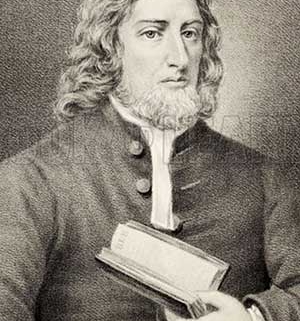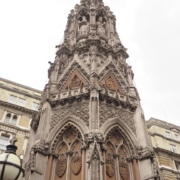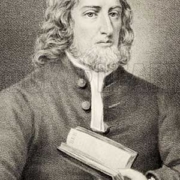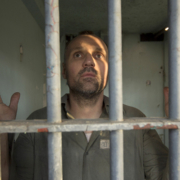The Death of John Welsh
King James had by this time assumed the thrones over both England and Scotland, and he vowed to imprison all preachers whose Gospel was not that of the State Church. Harboring for years an anger against the outspokenness of Welsh, the King was ready to make his move. Welsh’s final sermon at Ayr was on July 23, 1605. Its theme was “No Condemnation to God’s Elect.” On ending the sermon Welsh prayed, “Now let the Lord give His blessing to His Word, and let the Spirit of Jesus, Who is the Author of the verity, come in and seal up the truth of it in your hearts and souls, for Christ’s sake.”
Immediately after the sermon, the King’s men summoned him to force him to appear before a council in Edinburgh. Welsh would never see Ayr again. Welsh and other ministers were thrown into prison and indicted to stand trial. They went through the most unjust, illegal, and arbitrary proceedings that ended in a verdict of guilty to being heretics and traitors to the crown with a sentence of death.
Awaiting the date of execution, Welsh was delivered to a most brutal place of confinement called Blackness Castle. Welsh was put in a darkened dungeon that could only be described as “a barbaric foul hole that could only be entered through a hole in the floor.” The Castle still stands to this day, and the dungeon is an uneven floor with shelving rock, sharp and pointed so that a prisoner can neither sit, walk, or stand without pain. It was impossible to find comfort during sleep. There was no fireplace for warmth and no light to read by. For over ten months Welsh was imprisoned in this hell-hole.
After those ten months King James sent a letter to the council commuting the death sentence of the ministers and instead banishing them from the kingdom. Welsh was banished to France.
On arriving in France, Welsh immediately took on the Catholic oppression over the country and preached among the persecuted Protestants there. After years of playing cat and mouse with the church authorities, he was finally summoned to the court of King Louis XIII. The King then demanded of Welsh how he had dared to preach against the true Church on which principles his reign was founded. Welsh replied, “Sir, if your majesty knew what I preached, you would not only come and hear for yourself, but make all France hear it; for I preach not as those men who you are used to hearing. First, I preach that you must be saved by the merits of Jesus Christ, and not your own; next, I preach that you are the King of France, and there is no man on earth above you; but these priests whom you hear, subject you, the King, to a pope of Rome, which I would never do.” This totally disarmed the King of his anger and he instantly received Welsh into his royal favor, making him the King’s royal minister.
Living in relative peace to preach the Gospel, Welsh at this time was seized with an illness which his physicians said could only be removed by his returning to breathe the air of his native country. His wife then sought an interview with King James, who actually agreed to hear her. Dr. M’Crie, in his book the Life of Knox, records her famous interview with the King: “His Majesty asked her, ‘Who is your father?’ She replied, ‘John Knox.’ ‘Knox and Welsh,’ exclaimed the King, ‘the devil never made such a match as that.’ ‘That is quite right, sir,’ said she, ‘for we never asked his advice.’ He then asked her, ‘How many children did your father leave, and were they lads or lasses?’ She said, ‘Three, and they were all lasses.’ ‘God be thanked!’ cried the King, lifting up both his hands, ‘for if they had been three lads, I would never have enjoyed my three kingdoms in peace.’ She again urged her request that the King would give her husband his native air in Scotland. ‘Give him his native air! Give him the devil!’ the King replied. ‘Give the devil to your hungry courtiers,’ said she, offended at his profaneness. He then told her at last, that if she would persuade her husband to submit to the bishops, he would allow him to return to Scotland. Mrs. Welsh, lifting up her apron and holding it toward the King, replied, in the true spirit of her father and husband, ‘Please, your Majesty, I would rather have his head cut off and placed in my apron, than have him betray the truth!”
It took some persuading, but the King did relent, not to permit Welsh to return to Scotland, but to allow him to live in London. On arriving in London, Welsh immediately went to the pulpit and preached, but his time on earth was running out. Not long after that, he preached a long sermon, went home, and two hours later died in prayer in his fifty-third year of life. The doctors of that day said that Welsh died of “ossification of the limbs, brought on by much kneeling in his long and frequent devotional exercises.”






